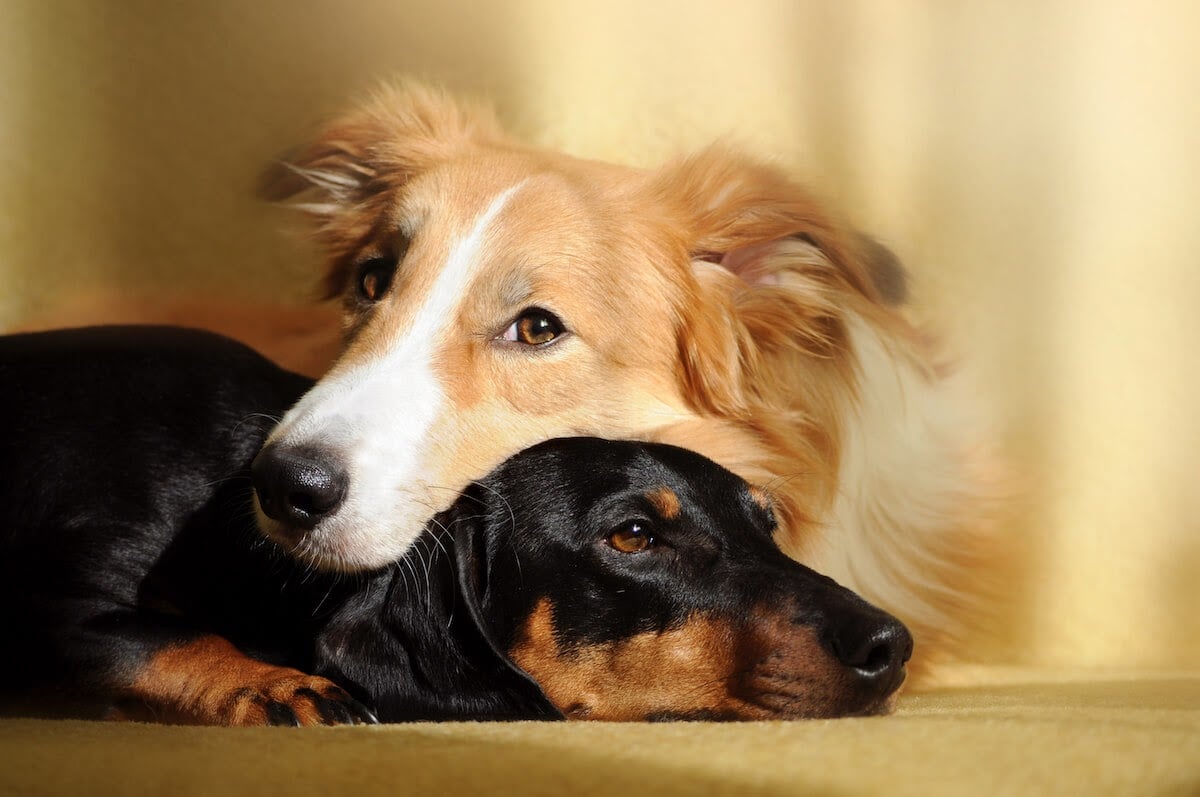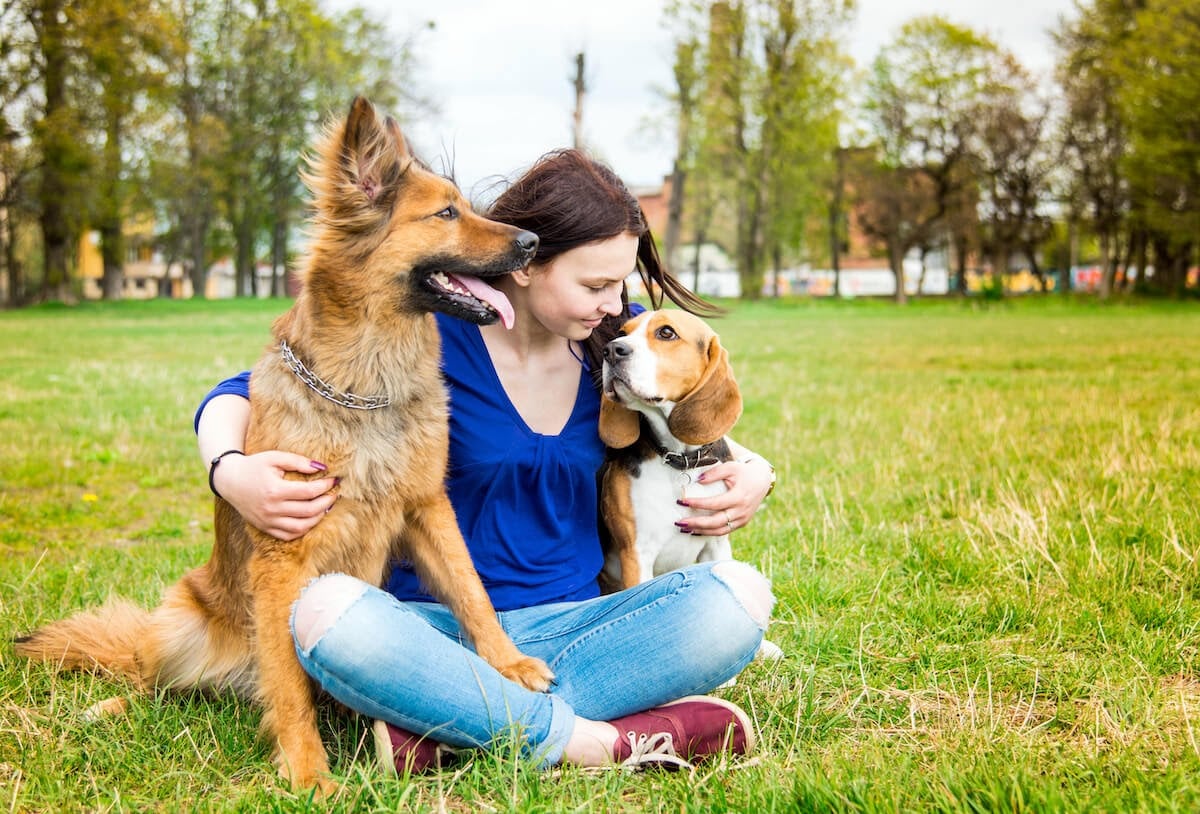Have you introduced a new canine companion into your home? While this is always exciting - and probably a little chaotic to start with - you may find that your older dog is a little stressed by a new pup on the block!
Behavioral signs that your older dog is stressed
Keep a watchful eye out for your dog's body language - these are indications that your dog might be stressed by the arrival of a new puppy:
- Is your older dog more irritable than normal?
- Are they showing no signs of interest in the puppy?
- Do they back away when the puppy is around and ignore it?
- Are they barking more often?
- Are they licking and gnawing a certain spot on their body?
- Have their toilet habits changed?
So what can you do to reduce the pressure and tensions between them?
10 Tips To Help Your New Pup and Older Dog Get Along
Take into consideration any age differences
Always remember that your older dog might not have the energy that your new puppy has, so take into account any age difference. This could mean that your older dog may want to sleep more, and will be less tolerant of a puppy who is raring to go and who always wants to play!
Try and spend more time with the puppy tiring them out - like playing ‘fetch’ with a ball to get rid of excess energy! But remember to include your older pooch too and let them join in when they want to.
Give them time to adjust to each other
Your new pup will be very inquisitive and excited when they meet their new, older friend. Your pup will probably be missing their littermates and will want to have a rough-and-tumble with your older dog - which may not go down too well.
Also, your older dog will have been the centre of attention in your home for a long time, and may think of the new puppy as an intruder, so take a while to adjust.
The key is to take things s-l-o-w-l-y!
When you first bring your new puppy home, try to make introductions on neutral territory, supervised at a safe distance, with both dogs on leads to start with. Let them follow their doggie instincts with lots of sniffing so that they can get used to each other’s smells.
Never leave them alone in a room by themselves until you are very confident that they can get along well together and will do no harm to each other.
Give them their own space
Your older, resident pooch will have had a while to settle into your home and have their own routine. Try to let them continue to have their own space to retreat to, with some quiet time where they can be alone. This may be in their crate, so you may also want to introduce your puppy to their own separate crate - a good way of keeping them in the same room, but safely apart.
Older dogs are often quite happy to chill out around the house or in their beds, saving their energy for their daily walks. On the other hand, puppies take a lot of naps and will be very playful when they wake up. It will take some time for them to adjust to each other, so giving each dog their own space will help both of them.
Make sure they have their own resources
Getting used to sharing things can take time. Make sure both dogs have their own beds, food bowls and toys, in separate rooms or areas, if possible.
It may work well if you have a stair gate between two rooms so that they can see and smell each other and have their own things separately.
Older dogs may find it difficult to share their resources, space and attention - after all, they’ve had everything to themselves until now! They’ve had the freedom of the house to eat and sleep wherever they want - and it may not come naturally to share this with a new bouncy puppy who seems to get all the attention.
Share the love!
Although you may find them irresistible, and want to give your new puppy lots of love and attention - don’t forget to do the same with your older dog. They may not like it if they suddenly don’t get the same fuss made of them as they used to. This may mean playing with your puppy and making more fuss of them while your older dog is taking a nap, then taking your older doggo for their favourite walk by themselves - that way everyone is happy!
Control the puppy energy!
Although you don’t want to suppress your puppy’s excitement and friendliness, you need to make sure that your older dog does not get stressed by a puppy’s constant attention.
You may find that your dog reacts by pushing the puppy away, barking or growling at them - and this is OK, as it’s a way of your puppy learning boundaries. But keep an eye on your dog’s body language and be ready to remove the puppy if it looks as though this situation might escalate into something else. Ensure you give your older doggo plenty of time to rest uninterrupted as they may look on the puppy more favorably after some time apart!
Focus on Training
Training your puppy from an early age will also help to control their energy. Taking them to a
puppy party or trying these Four Socialisation Steps will help your puppy adapt too.
Teaching both dogs to be gentle is important. Your older doggo may well already have a gentle nature that is being tested by the arrival of a new puppy, but reinforcing training on good behaviour to your dog and teaching your new puppy to be gentle is imperative if they are to become best friends.
Never Punish Your Pooch
Never punish your older dog for growling at the puppy - it’s their way of saying ‘back off for the moment - I need to get used to you first’. This will be a lesson learned by the puppy too, and they will be more careful the next time they approach.
If your older dog growls at the puppy, leave them be for a moment and try and reassure them both that all is well. If the growling continues, remove the puppy and put them in another room, then return to your older dog and give them more reassurance that everything is OK.
If the next encounter goes without any animosity, make sure you make a fuss of the older dog and give them a treat - but only if they don’t growl!
Reward good behavior
Dogs respond best to positive reinforcement and if you reward your older dog for being patient, and your new puppy for obeying you, they’re likely to remember what they have to do to get a treat - so don’t be afraid of making a fuss of them and giving them a lovely treat for good behavior.
Create a happy home environment
A calm home is a happy home so the quicker your older dog feels calm and comfortable with a new puppy in the home, and no longer finds the puppy a threat, the better it will be for the whole family.
If you need additional support, an ADAPTIL Calm Home Diffuser can help your dogs bond by creating a calm environment. An ADAPTIL Junior Collar can also support and reassure your pup as they learn and adjust to life in your household!
Remember, if you are concerned that your older dog is still stressed, it is always advisable to get them checked out by a vet to rule out any underlying issues.

